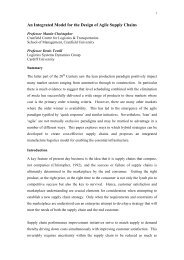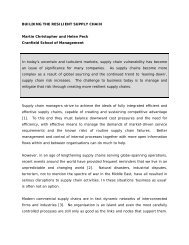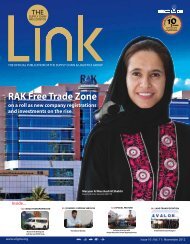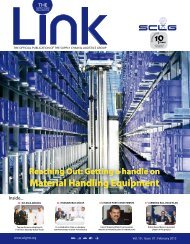Free to Download - SCLG
Free to Download - SCLG
Free to Download - SCLG
- TAGS
- download
- sclg
- sclgme.org
You also want an ePaper? Increase the reach of your titles
YUMPU automatically turns print PDFs into web optimized ePapers that Google loves.
IRELAND SPECIAL Business<br />
14 Link January 2011<br />
December 2010<br />
Dear Colleagues,<br />
I am delighted <strong>to</strong> have the opportunity <strong>to</strong><br />
greet my fellow <strong>SCLG</strong> Colleagues around<br />
the globe, the <strong>SCLG</strong> Management team<br />
in Dubai and most importantly our broad<br />
spectrum of members.<br />
In this special edition of Link, the<br />
focus will take on a very Irish aspect with<br />
contribu<strong>to</strong>rs from Ireland sharing their<br />
thoughts, viewpoints and experience on<br />
supply chain and logistics matters as<br />
they pertain <strong>to</strong> the market in Europe. The<br />
articles will provide an overview of the<br />
political, geographic social and economic<br />
demographics, which will influence the<br />
impacts on supply chain and logistics<br />
operations during 2011.<br />
Regular readers will be familiar with a<br />
number of our contribu<strong>to</strong>rs and we have<br />
added some new names and faces whom<br />
I trust will provide you with a broader<br />
range of views and opinions on SCM in<br />
Ireland.<br />
I would like <strong>to</strong> thank Patrick Francis<br />
and his team at Link for their help in<br />
producing this issue. Thank you <strong>to</strong> all our<br />
contribu<strong>to</strong>rs for their time and for sharing<br />
their expertise with us. A special note of<br />
thanks <strong>to</strong> our members for their continued<br />
support of <strong>SCLG</strong>.<br />
As an industry we are facing in<strong>to</strong><br />
some very challenging times where<br />
creativity and innovation will be the<br />
differential between merely surviving<br />
or achieving sustainable growth. Within<br />
the <strong>SCLG</strong> we have the thought leaders,<br />
practical implementers and energy<br />
drivers <strong>to</strong> keep us at the forefront of the<br />
new economy in the new year.<br />
With this mind may I wish you a very<br />
healthy and plenteous 2011.<br />
Kind regards,<br />
John Halpin<br />
President<br />
<strong>SCLG</strong> - Ireland<br />
Towards a Supply Chain<br />
Re-engineering Roadmap<br />
A comprehensive supply chain re-engineering<br />
roadmap must incorporate the four key<br />
issues discussed in the previous section. It<br />
starts with a market driven cus<strong>to</strong>mer service<br />
strategy which provides the performance<br />
specification for integrated SCM. In relation<br />
<strong>to</strong> supply chain organisation it requires a<br />
focus on processes and effectiveness, with<br />
a strong emphasis on network arrangements<br />
and shared services. ICT has the potential<br />
<strong>to</strong> facilitate integration between supply chain<br />
processes. However, for this potential <strong>to</strong><br />
be realised creative ICT strategies need<br />
<strong>to</strong> be developed and implemented. Again<br />
the focus needs <strong>to</strong> be on (value-adding)<br />
processes and on the people dimension.<br />
Finally, the integrated supply chain process<br />
KPIs provide organisations with a rational<br />
basis for continuous improvement. These<br />
measures feed back in<strong>to</strong> the development of<br />
the cus<strong>to</strong>mer service strategy thus closing<br />
the loop. This roadmap provides the basis for<br />
logical and systematic approaches <strong>to</strong> supply<br />
chain re-engineering. The Systems Approach<br />
is one such approach.<br />
Elements of The Systems<br />
Approach<br />
The systems approach <strong>to</strong> analysing supply<br />
chains and improving their performance<br />
recognises that the process of reengineering<br />
supply chains needs <strong>to</strong> be<br />
carried out in a logical and systematic<br />
manner. The approach has been developed<br />
based on the experiences of a range of<br />
companies in a range of different business<br />
sec<strong>to</strong>rs. There are at least four distinct<br />
constituent elements of this systems<br />
approach.<br />
The principles summarise the underlying<br />
thinking and concepts. If the supply<br />
chain under consideration is regarded as<br />
the system then the environment is the<br />
business environment in which that supply<br />
chain operates. The methodology is the<br />
series of steps <strong>to</strong> be followed in analysing<br />
and improving a typical supply chain. The<br />
methodology helps <strong>to</strong> identify the most<br />
suitable solution for a particular supply<br />
chain but there are approaches which<br />
appear <strong>to</strong> exist in the majority of worldclass<br />
companies. The guidelines on good<br />
practice summarise the main relevant<br />
elements of world class operating practice.<br />
Finally, the <strong>to</strong>ols and techniques support the<br />
implementation of the methodology.<br />
Concluding Comments<br />
Re-engineering is, first and foremost, about<br />
change. The development of a supply<br />
chain change management capability is of<br />
paramount importance if the re-engineering<br />
process is <strong>to</strong> result in real change and<br />
sustainable performance improvement. The<br />
reality in <strong>to</strong>day’s competitive world is that<br />
standing still effectively means falling behind.<br />
Innovation in all aspects of SCM is the key <strong>to</strong><br />
survival and success. It is also worth noting<br />
that in reality most innovation is a series<br />
of small incremental steps in line with the<br />
Japanese Kaizen principle. The approach<br />
<strong>to</strong> re-engineering outlined in this article<br />
focuses on the four key aspects of service<br />
delivery based on clearly unders<strong>to</strong>od market<br />
requirements, integration of supply chain<br />
activities and data, supply chain organisation<br />
and the measurement of performance.<br />
The systems approach (<strong>to</strong> analysing<br />
supply chains and improving their<br />
performance) provides a basis for achieving<br />
world class standards for supply chains<br />
operating in all types of industry. The<br />
approach involves considering the whole<br />
supply chain and avoiding a situation where<br />
subsystems are optimised but the whole<br />
supply chain is sub-optimal.

















